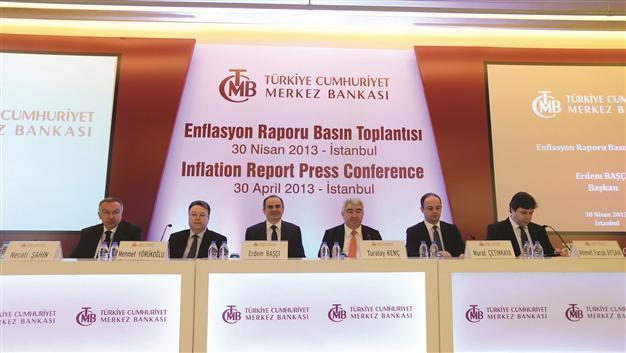Bond rates hit historic low on Central Bank optimism
ISTANBUL - Hürriyet Daily News

Turkish Central Bank Gov. Erdem Başçı (3rd L) and the other members of Monetary Policy Committee present the bank’s quarterly inflation report. AA photo
Remarks by the Turkish Central Bank governor implying that the low-interest environment would persist have sent the yield on Turkey’s benchmark bond, which was already on a declining trend, to a record low.“The bank would think about trimming short-term rates if the [Turkish Lira’s] real exchange rate rises above 120 on its index,” Central Bank Gov. Erdem Başçı said yesterday at a press meeting where the bank’s quarterly inflation report was presented.
During the conference, the Central Bank said it kept its inflation assumption for the yearend unchanged at 5.3 percent compared to the previous January report, saying it takes and will take the necessary measures to ensure that.
The yield on Turkey’s benchmark bond sank to a record low under 5.17 percent in the wake of the statements, as Başçı’s words were perceived as indicating that more interest cuts may be on the way.The bond yield was already on a downward track caused mainly by the high liquidity by central banks to global markets.
The Turkish economy’s growth slowed down steeply with 2.2 percent, disappointing after the impressive rate of 8.8 percent in 2011. Aiming to stimulate growth, and guard against hot money fueling a sharp rise in the lira, the Central Bank had slashed on April 16 its three main policy rates.
Başçı said there had been a slight pickup in growth in the first quarter and the trend would continue in the second, with growth expected to be higher this year as a whole than in 2012. Still, weak domestic demand was the reason underlying the slow growth and “it remains weak,” Başçı said.
Commitment to inflation battle
The Central Bank’s 2013-end inflation forecast of 5.3 percent is mainly sourced by the upward revision of commodity prices and has been compensated by the downward revision in food prices.
After the expected fluctuations in inflation in the short term due to the base effect in energy prices, it is assumed it will end up at between 4.1 percent and 6.5 percent – with a midpoint of 5.3 percent – at end-2013, the report released yesterday said.
In order to achieve the year-end inflation target, foreign balance shouldn’t be disrupted, loan growth should continue moderately and the foreign exchange rate shouldn’t be overvalued, Başçı said.
“Therefore, we believe the best policy combination for the current conjecture is, while keeping up with the global low interest environment, to take steps to raise our foreign exchange reserves,” he said, redeclaring the bank’s commitment to macroeconomically cautious policies to back balanced growth.
He expected loan growth, which has been running at around 19 percent, to be in line with its medium-term target of 15 percent by the end of the year.
















